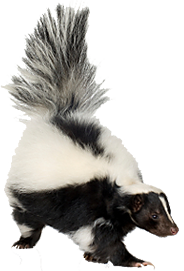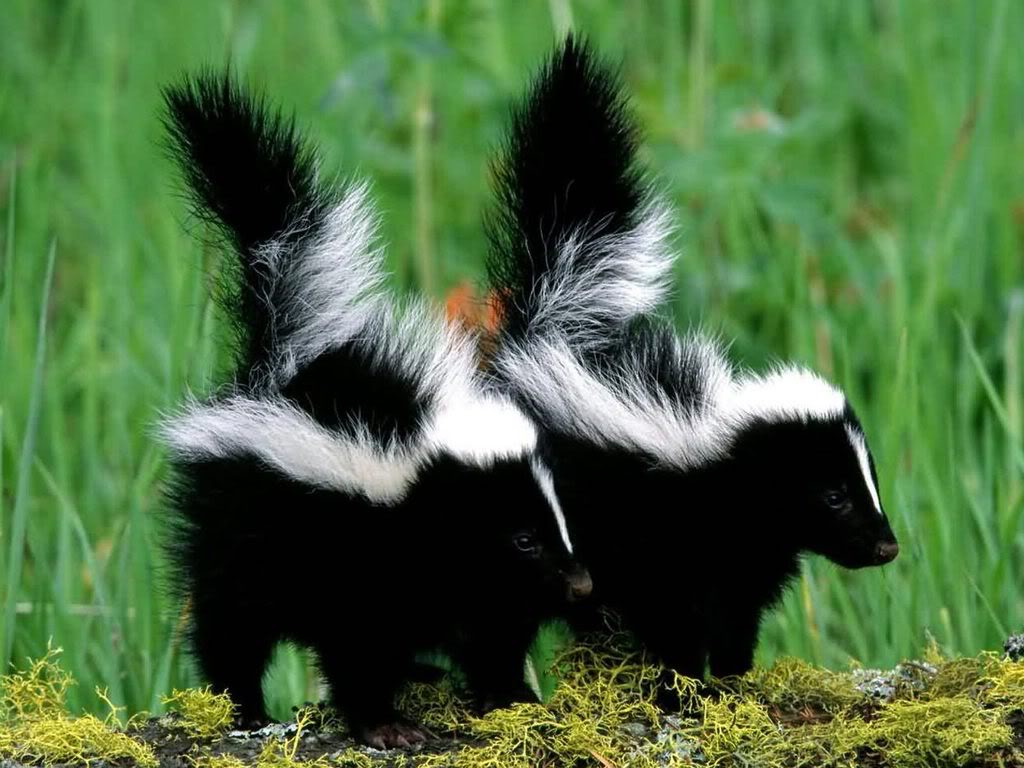
Skunks
Skunks
ABOUT SKUNKS:
The striped skunk (Mephitis mephitis), is a member of the mustelid family, including weasels, martens and badgers. Skunks range from Canada, through the U.S. and to Central South America.
JOB DESCRIPTION:
Skunks love to live under structures such as decks, sheds, additions, concrete slabs etc. So, to exclude them from an ideal location and prevent them from re-entering, we install a heavy gauge screening into the ground. This screen is installed in such a manner so that they cannot dig under it. Once the screen is in place, a special one-way door is installed to allow the skunks to exit, and the screen stays there permanently too prevent the problem from ever re-occuring. The area is then deodorized to remove the urine and fecal odours left behind from the skunks that will act as an attractant to other skunks or raccoons in the neibourhood.
WORDS FROM WILD THINGS:
Skunks are by far the most determined animals we encounter. Because they cannot climb, they are forced to live on the ground. This makes den sites limited so that when they find an ideal dwelling or nesting place, they are very determined to keep it. Skunks are use to people placing rocks, and bricks in their holes to keep them from living under their structures. We meet a lot of customers who have tried to evict skunks for many, many years to no avail. Skunk problems do not go away and the only way to stop a re-occurring problem is to install a permanent fixture. Using mothballs, cayenne pepper, and other non-permanent solutions are a waste of time! Also, trapping and re-locating is not the answer. The skunks that are causing your problem are not the only ones in the neibourhood. The situation is better understood and solved if you look at the den area as the problem, not the skunks!
WORDS FROM WILD THINGS:
Skunks are by far the most determined animals we encounter. Because they cannot climb, they are forced to live on the ground. This makes den sites limited so that when they find an ideal dwelling or nesting place, they are very determined to keep it. Skunks are use to people placing rocks, and bricks in their holes to keep them from living under their structures. We meet a lot of customers who have tried to evict skunks for many, many years to no avail. Skunk problems do not go away and the only way to stop a re-occurring problem is to install a permanent fixture. Using mothballs, cayenne pepper, and other non-permanent solutions are a waste of time! Also, trapping and re-locating is not the answer. The skunks that are causing your problem are not the only ones in the neibourhood. The situation is better understood and solved if you look at the den area as the problem, not the skunks!

DAMAGE:
Skunks are known for doing a lot of damage to lawns while they are digging for grubs. Skunks can cause a great deal of damage to structures by damaging insulation underneath additions and can cause concrete slabs or steps to sink by undermining them. Skunk odour is amazing in the fact that it can easily penetrate through an eight-inch thick concrete wall and still be strong enough to wake someone from a dead sleep. The odour can be so strong that it smells like burning rubber rather than skunk. This odour can bond to metals, fabrics, and can be very difficult to remove.
CONCERNS & DISEASES:
Rabies is a virus that attacks the central nervous system of warm blooded mammals. The most common animals infected are foxes, skunks, bats, and raccoons. Rabies is spread through saliva most commonly through bites. It may also be contracted by being licked or scratched by an infected animal. Once signs of rabies start to appear the chances of survival are less than 20%. This makes it a good idea to keep your pets vaccinations up to date. It is also recommended for humans to be immunized if they work with a number of animals on a regular basis.
BENEFITS:
Skunks feed on grubs and other insects that are pests to humans. They also keep the rodent population in check by feeding on mice and baby rats. Skunks are also carrion feeders and therefore keep our roadways and neighbourhoods clean.
LITTLE KNOWN FACTS:
- Can spray accurately up to 10-15 feet
- Skunks weigh 6-10 lbs on average
- Can have 1-9 babies in one litter
- Skunk odour is created by sulphuric acid
- Commonly stamp their feet as a warning before spraying
- Skunks are normally gentle and non-aggressive
